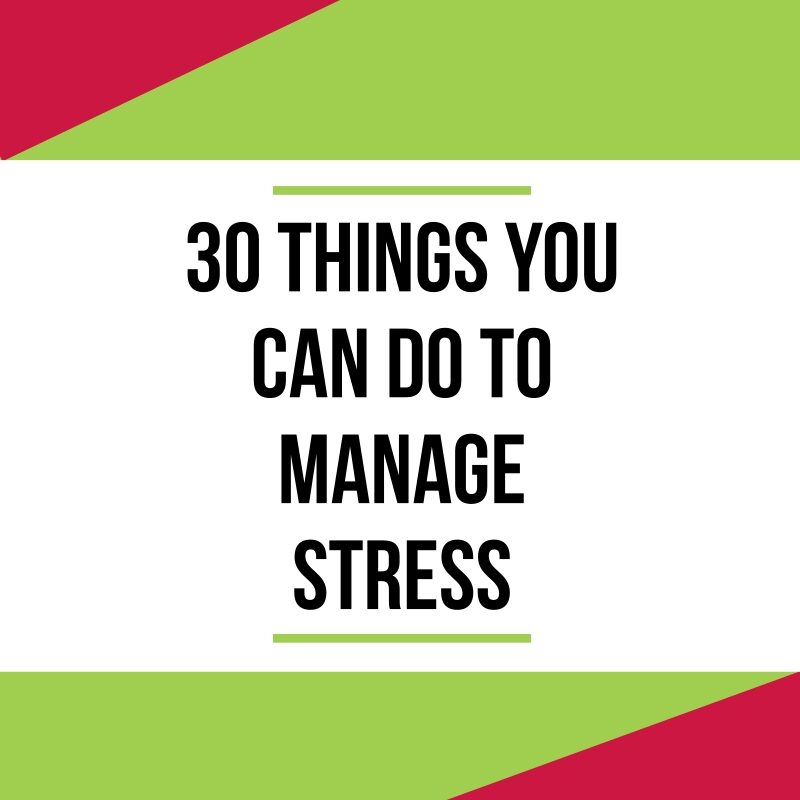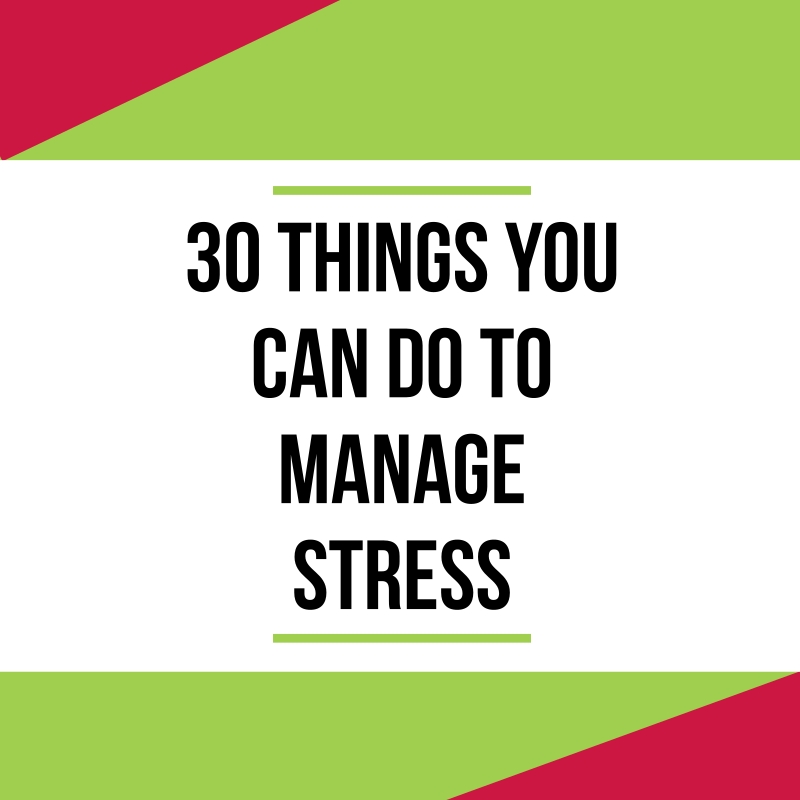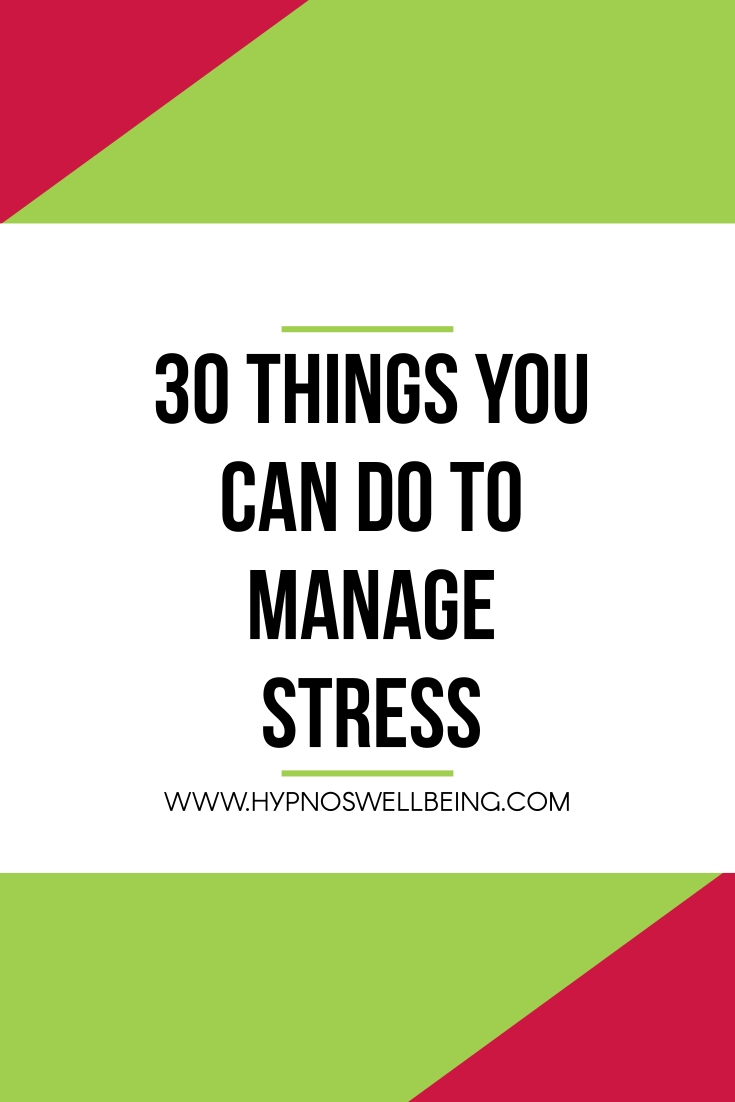30 Things You Can Do to Manage Stress
Have you ever wished that you could go back to when you were younger?
I know I have!
Back when we were kids and teenagers, life wasn’t as stressful because we didn’t have nearly as many responsibilities or expectations thrust on our shoulders. Now that we’re adults, it can feel like that’s all we have – and that can be stressful.
But what if there was a way to manage your stress so that you could have more peace and joy in your life? What if you had an arsenal of techniques you could use to alleviate, reduce, or even eliminate some of the day-to-day stress that you experience?
That’s what this article is all about! Below, you will find some simple techniques you can use to manage stress. Most are free and can be done at home. I hope that this list helps you to develop some coping mechanisms you can turn to when life takes a turn for the stressful.
Before we dive into the stress management techniques, let’s talk about the symptoms of stress. I feel like most people assume that when you’re stressed, it looks or feels a certain way. In reality, though, stress can manifest itself in so many different ways.
Common Symptoms of Stress
Below are some common signs that you’re stressed:
- Difficulty falling asleep
- Difficulty staying asleep
- Sleeping too much
- Nightmares/disturbing dreams
- Fatigue
- Grinding your teeth (while awake or in your sleep)
- Panic attacks
- Difficulty breathing
- Headaches
- Difficulty concentrating on tasks
- Disorganization
- Forgetfulness
- Confusion
- Stomach pains
- Sweating
- Cold, sweaty hands/feet
- Heartburn
- Nausea
- Sense of overwhelm
- Decreased decision-making skills
- Obsessive/compulsive behaviors
- Tremors, especially of hands and lips
- Jaw-clenching
- Dry mouth
- Difficulty swallowing
- Skin rashes/hives
- Itchy skin
- Excessive belching/flatulence
- Chest pain
- Heart palpitations
- Rapid heartbeat
- Frequent urination
- Constipation
- Diarrhea
- Diminished sex drive
- Diminished interest in social activities
- Little interest in appearance
- Feelings of anxiety and nervousness
- Mood swings
- Depression
- Crying spells
- Sense of loneliness
- Increase in anger or irritability
- Increased appetite
- Weight gain
- Decreased appetite
- Weight loss
- Fidgeting
- Decreased motivation or productivity
- Increased usage of drugs or alcohol
- Impulse buying
- Excessive gambling
Stress Management Techniques
If you read through the list above and realize you have symptoms of stress, here are some techniques I urge you to try. Keep in mind that just as stress looks and feels different for everyone, so does the way that we all manage it. What works for one person may not work for you – and vice versa. So, if you try one technique and realize it just isn’t the right fit, try something else. Keep in mind that these techniques are not in any particular order, so read through the entire list.
Mindful Breathing
When you’re in the midst of a stressful situation, it can help to take deep, mindful breaths. Inhale deeply through your nose for 3 seconds, hold your breath for 2 seconds, and then let out a long exhale through your mouth for 4 seconds. While breathing, focus only on what you are doing. and how it feels. Repeat this until you feel as though you have calmed down.
Get Some Fresh Air
Do you remember how much time we spent playing outdoors as kids? As adults, we know that our parents were likely trying to get us to “burn off some energy”, but did you know that just being out in fresh air does a body good. Not only can it help strengthen your immune system, but it can also give you a boost of energy – which can be great when you’re feeling depleted because of stress. While you’re out, “stop and smell the roses” — the smell of some flowers (like roses, lavender, and jasmine) can help with relaxation.
Go for a Walk
While you’re out in the fresh air, why not go for a stroll? Whether you opt for a casual stroll or a brisk walk, the activity can produce endorphins — chemicals that not only alleviate pain, but stimulate relaxation. It can also help you release some of the stress you carry in your body by helping you loosen up tight muscles. While walking, let go of all of your worries by focusing on the world around you. Pay attention to the way the air feels on your skin, to the sound of the birds and other wildlife scurrying around, to the clouds in the sky, and anything else that captures the attention of your senses.
Aromatherapy
Not too long ago, I mentioned the relaxing effect that the smell of certain flowers can have. If that appealed to you, you may love aromatherapy. Certain scents are known to have a therapeutic effect. Here is a list of essential oils that are believed to have positive benefits when used in aromatherapy:
- Basil
- Bergamot
- Chamomile
- Frankincense
- Fennel
- Geranium
- Jasmine
- Jatamansi
- Lavender
- Lemon
- Lemon Balm
- Lemongrass
- Lime
- Marjoram
- Neroli
- Orange
- Patchouli
- Rose
- Sage
- Valerian
- Vetiver
- Ylang Ylang
- Yuzu
- Have a Screaming Session
Have you ever been so stressed out that you literally want to scream? Instead of holding it in – let it out! Holding in your emotions is rarely a good thing. It’s better to give them a healthy, controlled release. The next time you feel like screaming, go somewhere where you can do just that. Some good places to let out a good scream include your car, an empty park or beach, or on top of someplace high (like a rooftop or mountain). If none of those are available, screaming into a pillow can be just as good. Screaming can cathartic and therapeutic. In fact, primal scream therapy is an actual method of psychotherapy. Scream as loud as you want, for as long as you need in order to feel a sense of relief.
Have a Crying Session
Another form of catharsis is to have a good cry. When you feel like crying, the best thing to do may be to just give in to the feeling. Studies suggest that stress crying can actually help your body release toxic chemicals, like cortisol — the stress hormone. It can also release oxytocin and endorphins – both of which can lead to an improved mood.
Start a Creative Hobby
One way to combat stress is to find a creative hobby that you enjoy. Something active and/or hands-on that will occupy your mind/body as well as fill you with joy. Some ideas include painting, drawing, crochet, knitting, photography, dance, sculpting, graphic design, and baking. Need more ideas? Check out this list of 150 Creative Hobbies.
Spend Time with Loved Ones
When you feel stressed, call on your loved ones and ask to hang out. If you have children or a spouse, spend some more quality time with them. Just being around people you love who make you feel happier can be a great way to alleviate stress. When you’re with them, be sure to be mindful and present. Focus on them and the activities you do together.
Ask for a Hug
There’s a reason that oxytocin is sometimes called the cuddle hormone. Studies show that a hug can help increase oxytocin levels, which helps improve your mood. When you’re feeling stressed, ask someone close to you for a hug. (At the time that I’m writing this, we are still in the midst of the COVID-19 pandemic, so please exercise caution).
Read a Good Book
Is there a book or series that never fails to make you feel better? Grab a copy and settle in for a good read. You can also ask friends and family for recommendations of books they think you would enjoy. Avoid books that have triggers that will cause you to feel sad, anxious or stressed.
Watch Your Favorite TV Show or Movie
If you don’t enjoy reading or prefer something different, you can also choose to watch a good TV show or movie to take your mind off of the things that stress you out. Even just 30 minutes a day of escape can make a difference.
Say “No” to Things That Stress You Out
Do you find yourself constantly saying “yes” to things that you don’t really want to do? It could be out of a sense of obligation or because of people-pleasing tendencies. Either way, if you have the option to say “yes” or “no” to something and you KNOW that it is just going to stress you out…exercise your right to say “no”. If you don’t have the option to say “no”, find out if there is a way to lessen the load by getting help on the task.
Reassess Your To-Do List
On a related note – take a look at your to-do list. Is there anything on that list that you hate doing or that causes you stress? Find out if there is a way to eliminate that task, get help with it, or delegate it to someone else.
Cut Out Stressors You Can Control
Are there things in your life that stress you out needlessly? Take control and eliminate the things that you can. For example, if being on social media tends to stress you out because of all the negativity, limit the amount of time you spend on social media. Take social media breaks. And don’t be afraid to unfriend or unfollow people who do nothing but bring negativity in your life. You can also implement that in your offline life. Cut out people, situations, and experiences that only serve to harm you mentally, emotionally, or otherwise. It may not always be easy, but it’s worth it in the long run.
Get Some Rest
While stress can definitely cause you to have sleep problems, it can also be compounded by a lack of sleep. Try your best to get more GOOD rest. Go to bed at a decent hour each night. If you have trouble falling asleep, try listening to a sleep meditation, white noise, or some other type of audio recording designed to help you relax and fall asleep. Need help finding one? Check out this list of 10 Best Guided Meditations for Sleep and Insomnia. Also, keep in mind that getting more rest goes beyond getting a good sleep at night. It can mean taking short naps and even just sitting down and relaxing for a bit.
Meditate
It should come as no surprise that meditation is on my list of things you can do to manage stress. Meditation has long been known to help the mind and body move into a more relaxed state. It helps you to escape from the mental and physical overload that most of us experience as we go throughout the day. It also helps you to be more mindful, focusing on the present moment rather than the more stressful past and future moments that you have no control over. Practicing mindful meditation for even just 10 minutes per day can be extremely useful in helping you to minimize your stress levels. One great resource for learning about and practicing meditation is Headspace. The Headspace website and app are both worth checking out.
Guided Imagery
Another form of meditation is using guided imagery. It is essentially using your imagination to envision a person, place, or time that makes you feel more peaceful, relaxed, and happy. In other words, you mentally go to your happy place. The more detailed your imagery is, the better. For example, you can try to imagine not just the sights, but the sounds, smells, and feelings associated with your “happy place”. You can also use guided imagery to imagine yourself pulling all of your stress and worries out of your mind, locking them up in a container, and burying the container deep in the ground. You can find several guided imagery exercises on Youtube that you can use to familiarize yourself with this method.
Exercise
So far, we’ve talked about a lot of mental and emotional exercises you can practice to manage stress. Now let’s talk a bit about physical exercise. Getting up and moving can be a great way to produce endorphins, take your mind off your stressors, and give you an outlet for your feelings. You can take all of your frustration about the things that are stressing you and put that energy into your preferred form of physical activity. It can also help improve your sleep – which both impacts and is impacted by stress levels. Exercising doesn’t have to be costly or expensive either. While you’re free to go to a gym or swimming pool to get your exercise in, you can also go for a walk or run, go skating, ride a bike, lift weights, go hiking, or pop in a workout DVD. You can also find tons of Youtube fitness channels to find a workout that fits your needs.
Practice Yoga
Another great form of exercise is yoga. However, I put it in its own category because it’s more than just exercise. It also involves a lot of mindful breathing and meditation. If you don’t know much about yoga and can’t get to a gym, I highly recommend checking out the Youtube channel, Yoga with Adriene. She is a great teacher, whether you’re a yoga beginner or have been practicing for years.
Keep a Daily Journal
Journaling is a simple, accessible, and very cheap way to manage stress. All you need is something to write with and something to write on. Or, if you prefer a digital journal, a computer or tablet. You could even keep an audio journal if you don’t like to write. You can start by writing down the worries, fears, and situations that are causing you stress. Journaling is a healthy way to explore your thoughts and feelings. . However, it can also help you to view things from a different perspective and help you to reflect, approach, and resolve problems and challenges that you’re faced with. One specific type of journaling that you can do to help you focus on the positive things in your life is to start a gratitude journal. Every day, you can write down what you feel grateful for in that moment. The more you do this, the more you will be able to recognize and embrace the good things in your life – even when you’re feeling stressed ou.
Start a Gratitude Jar
Speaking of gratitude, one idea I love is to start a gratitude jar. It is similar to a gratitude journal, but is more visually impactful. Every day, write down things you are grateful for on slips of paper. Fold the papers up and put them in a mason jar. As you move throughout the year, you will watch your jar fill up with all kinds of gratitudes. At the end of the year (or whenever you need a reminder), open the jar and read through the things that you’ve felt called to record. It can be a very empowering feeling.
Repeat Positive Affirmations
While we’re on the topic of empowerment, positive affirmations can be a great way to empower yourself on a regular basis. Choose or create positive affirmations that you can repeat to yourself – especially ones related to goals you’ve set for yourself emotionally, physically, financially, and otherwise. Repeat these affirmations whenever you need a bit of encouragement. If you struggle with coming up with personal affirmations, check out this list of 100 positive affirmations for inspiration.
Focus on Positive Self-Talk
Another important thing to do for your overall mental and emotional wellbeing is to cut out the negative self-talk and replace it with positive self-talk. If you’re like the average human being, it is so easy to slip into negative self-talk. Whenever you catch yourself saying something negative about yourself (whether verbally or silently), counter it with something positive. If turning it into something positive doesn’t quite feel natural, try turning it into a question. For example, instead of saying “I can’t handle this”, ask yourself “How can I handle this?”. Reframing that thought as a question can force you to examine the situation from a solution-focused perspective.
Practice EFT
One technique that is growing in popularity is the Emotional Freedom Technique (EFT), also known as tapping or psychological acupressure. It’s a way to keep your mind focused on the physical tapping rather than negative or unwanted thoughts. With a basis in Eastern medicine, it’s believed to help balance energy in the body and relieve symptoms associated with all kinds of physical and emotional issues. For guidance on this method, check out the article, How to Do EFT Tapping to Relieve Stress and Anxiety.
Progressive Muscle Relaxation
Another great way to alleviate stress and anxiety is Progressive Muscle Relaxation (PMR). It is a relaxation technique that combines mindful breathing with the intentional contraction and relaxation of your muscles to help alleviate muscle pain and tension. The idea is that once you’ve gotten your physical self into a more relaxed state, your mental self will follow suit. You can combine PMR with a form of guided imagery by imagining the stress leaving your body as you relax each group of muscles. For an example of how you can use this method, check out this Guided Progressive Muscle Relaxation video.
Get a Massage
If you want to outsource the muscle relaxation, a massage is a fantastic option. You can either visit a local spa to get a professional massage or ask a loved one to give you a massage. The combination of relaxed muscles and physical contact (which can trigger the production of oxytocin) can work wonders for stress.
Eat a Balanced Diet
In addition to making sure you move your body, you should also be mindful about what you put into your body. Did you know that certain foods and beverages can help fight or reduce the effects of stress? On that list are:
- Complex carbs like oatmeal, pasta, and whole-grain bread
- Oranges
- Spinach
- Fish that are high in Omega-3’s like salmon and tuna
- Black tea
- Nuts and seeds like pistachios, almonds, and walnuts
- Avocados
- Raw veggies
- Milk
You can also take herbal supplements like St. John’s Wort to help alleviate anxiety.
Build a Support System
I can’t write an article about managing stress without talking about how important it is to have a support system. Having people you can turn to vent to, ask for advice, ask for help, or even just get a hug from can be a literal lifesaver. If you don’t have friends or family you can turn to, you might be surprised by the type of genuine community and friendship you can find online. I would start by joining online groups (such as on Facebook) that have people you can relate to. For example, you can find tons of groups for various hobbies and social groups. Find a few groups you resonate with, join them, and then start engaging. As you engage, you will likely find yourself connecting with people you can relate to. Some of the best people I know are people I met online.
Go to Therapy
Of course, I also have to mention the fact that therapy is always an option if you find yourself dealing with chronic stress and feel like the other options you have aren’t viable. If your insurance doesn’t cover therapy and you find yourself struggling to pay out of pocket, contact a local training clinic or a university with a counseling psychology program. You may be able to receive free therapy by working with a counselor-in-training. You may also have luck with a community health center or a support group, both of which are typically free or low-cost.
Talk to Your Doctor
Last, but not least, if you feel that stress is negatively impacting your daily functioning or are concerned that there may be an underlying physical or mental health issue, speak to your primary care provider to discuss other options.
Want to save this post for later? Pin the image below so you can always find it when you need it! Also, please share it with anyone in your life that you believe would benefit from these stress management techniques.




